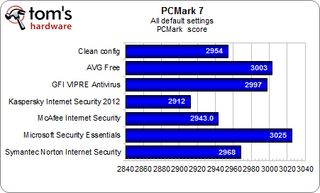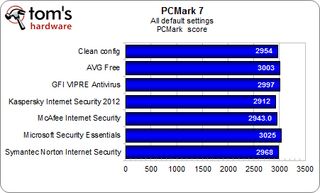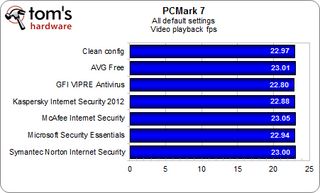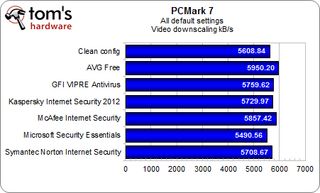Do Antivirus Suites Impact Your PC's Performance?
Most of us are now fairly confident that our antivirus scanners are doing their main job of protecting our systems from malicious pests. But what are those scanners doing to system performance behind the scenes? Are some scanners better than others?
PCMark 7 Results
Here we come to the meat of our testing. When you have real applications running and you’re manipulating real media content, how much of a burden is your AV software? There are two ways to look at the answer, and we’ll show both. Here are the overall PCMark7 score results with the horizontal axis set to Auto:

This view magnifies differences in the results. The obvious conclusion is that Kaspersky seized the day and Microsoft...didn’t. Now let’s start the horizontal axis to 0 and see how things look:

It’s an even field, right? Suddenly, you no longer care about performance—they’re all practically the same—and you’re back to thinking about pricing and features. In fact, the real take-away here might be that there seems to be little to no impact from AV products on application performance. Kaspersky and McAfee even slip in just under our clean config score, again defying intuition and making the case for normal statistical variance in this test load.
So much for our lesson in statistics manipulation. You know that PCMark is comprised of several tests examining different usage scenarios, so let’s break this down.

A few AV products claim to improve rich media content performance, but if this test, which focuses on video playback frame rates, is any indication, such enhancements are totally absent from our test group. We found no statistically significant variance.

With video downscaling, we see a big of wiggle. In an odd twist, every competitor except Microsoft narrowly outperforms our clean configuration. AVG squeaks in with the win, but it’s practically a photo finish for all players. Again, we see little influence from antivirus background scanning in either direction.
Stay on the Cutting Edge
Join the experts who read Tom's Hardware for the inside track on enthusiast PC tech news — and have for over 25 years. We'll send breaking news and in-depth reviews of CPUs, GPUs, AI, maker hardware and more straight to your inbox.
-
dogman_1234 Regardless what anyone says: Using McAfee is like using a Glad garbage bag as a condom.Reply -
Martell77 I've been using Trend Micros AV since y2k and haven't had a reason to switch. Because of the systems my clients have I never recommend Norton or McAfee and if they have it I always recemmend they switch. Its truely amazing how the performance of their systems increases after getting rid of those AVs, especially Norton.Reply -
soccerdocks On the scanning time page there is an error in the second graph. It also says first run.Reply
Also, the timing of this article was excellent. I had just been doing some research about what anti-virus software I should switch to, mainly based on performance, but I guess I just got all the information I needed. -
compton Some of the results seem mysterious, like all the times the no-AV configuration scored lower in many tests than it should be faster in. Is it possible that using the Wildfire as the system drive instead of the platter would have eliminated this behavior? In general, I hope there is a second part to this that does include SSD runs. I would think any advantage AV products have vs. the no-AV config would evaporate.Reply
I stopped using AV products on my personal systems back in 2003. Norton back then was god-awful on a Pentium 4 systems, seemingly crushing the life out of a system. Even with a first generation WD Raptor 36GB my P4 2.6 would choke not only with Norton, but also McAfee. I might not use AV software, but I do put it on my family members' systems when it doesn't kill performance. In that respect these modern solutions seem much better.
-
ChiefTexas_82 On my Pentium D I have to run McAfee when I'm gone for a good while or sleeping as my computer slows to a crawl during the scan. Even bringing up the menus to stop the scan take way too long.Reply -
darkstar845 Why didn't they test this on a computer with average specs? The 8gb ram and very fast CPU might be offsetting the impact that the AVs put on the computer.Reply -
bit_user Thanks for this. I remember the bad old days when AV could make software builds take several times longer.Reply
-
cdhollan While my comment is completely tangential, but my inner chemical engineer can't resist making a small correction in what is otherwise a great article:Reply
>>Apparently, this is somewhat like saying you can boil water at 230 degrees Fahrenheit instead of 260 degrees. As long as the water is at 212 degrees or higher, no one really cares. -
rottingsheep installing vipre speeds up your computer?Reply
i think something is wrong with your numbers. -
Amazed ESET is not being tested considering it sells itself on its performance over the competition while maintaining the same levels of protection.....Reply
Most Popular

